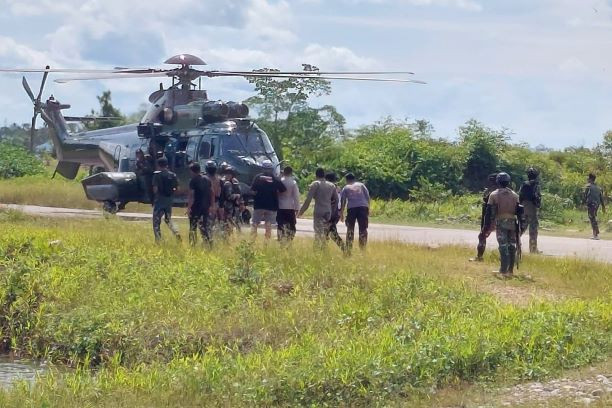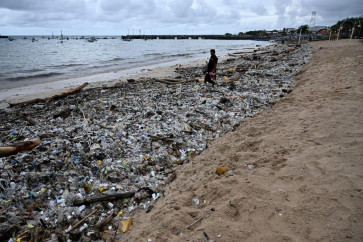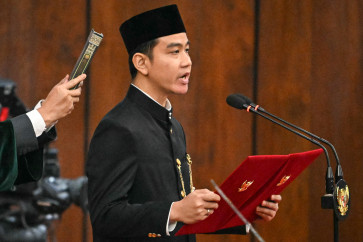Envisioning a counterinsurgency strategy for Papua
The development approach to the Papua issue will only succeed if it is part of a counterinsurgency strategy that prioritizes a population-centric approach, rather than the conventional approach of finding and destroying enemy forces.
Change text size
Gift Premium Articles
to Anyone

T
he West Papua National Liberation Army (TPNPB), the military wing of the Free Papua Movement (OPM), has been holding Susi Air pilot Philip Mehrtens hostage for three weeks. The TPNPB is demanding pressure on the Indonesian Military (TNI) to withdraw from Papua, a significant reduction in TNI troops and recognition of an independent Papua.
This incident is just the tip of the iceberg in the face of Papua's governance, security and humanitarian crises. The accumulation of these three crises has created a complex situation, which includes the development of separatism, armed separatist movements, acts of terrorism, a culture of violence and a sense of injustice.
The Jakarta Post's editorial titled "Politics holds Papua hostage" on Feb. 16 brings attention to the overall security strategy in Papua, which emphasizes the deployment of a significant number of personnel from the TNI and the National Police (Polri) to safeguard national borders, protect critical infrastructure and enforce law and order. The editorial also provides insights into the lack of a definitive and quantifiable political resolve to address the intricacies of the issues, particularly the absence of a specific security road map in Papua.
Given the current security approach, it is time for the government to boldly formulate a counterinsurgency (COIN) strategy in Papua, particularly in territories suspected of being strongholds of the separatist group.
The COIN strategy needs to emphasize three crucial aspects. First, there needs to be justification for adopting the COIN approach. Second, the purpose of counterinsurgency must be defined. Third, it is crucial to determine the appropriate implementation methods.
There are five justifications for implementing a critical COIN approach. First, it will ensure state authorities’ presence and control in the region, thus guaranteeing security and order for all citizens. Second, it will uphold the law and promote effective governance.
Third, it will help break the cycle of violence, both vertically and horizontally. Fourth, it will facilitate resolution to the prolonged conflict in Papua. Fifth and finally, these justifications can serve as the foundation for implementing a COIN strategy in Papua, which falls under the category of low-intensity conflict, as defined by Martin van Creveld in 1991.
From a tactical perspective, taking a COIN approach in Papua is a comprehensive effort to eliminate armed separatist groups to restore public order. To further define the objectives of this approach, David Galula's perspective on COIN operations is still relevant in the Papuan context. In his Counterinsurgency Warfare (2006), Galula says military aspects make up only 20 percent of an operation, while the remaining 80 percent focuses on technocratic aspects, such as economic development, law enforcement, public services, implementation of good governance and dissemination of open and accountable information.
By emphasizing these aspects, the COIN strategy can more effectively achieve its objectives in Papua.
The ultimate objective is to enhance the legitimacy of the local administrations in Papua. This goal requires a clear political will to implement policies that prioritize public services, encourage good governance and strengthen accountability and transparency of local administrations. By doing so, the local administrations can establish a positive image among the population, which is essential to building trust and achieving stability in the region.
It is important to note that the three aforementioned policies will be effective only if they address the main obstacles that hinder good governance as part of the COIN strategy in Papua. These obstacles include corruption, poor public services and the need to improve the welfare of indigenous Papuans (OAP).
The failure of the COIN strategy in Afghanistan of the International Security Assistance Force (ISAF) as a result of corruption can serve as a lesson. The lack of government vision, policies, development plans and law enforcement accelerated the complex ecosystem of corruption and abuse of power. Consequently, the state failed to provide adequate public services and protection for its citizens (Kilcullen & Mills, 2021). Therefore, it is crucial to address these issues in Papua to ensure the success of the COIN strategy implemented there.
In addition, identity politics that justified the establishment of new autonomous regions in Papua is a matter that requires attention. In his analysis, Vidhyandika D. Perkasa (2023) says the formation of the new regions has led to demands from indigenous Papuans for administrative posts in the newly formed regions. There is a significant concern if the central government fills these positions with individuals who are not indigenous Papuans.
The third point to consider is the need for operations that suppress insurgency to prioritize a population-centric approach, instead of enemy-centric or conventional operations that focus on finding and destroying enemy forces through search-and-destroy tactics. Historical examples like the Vietnam War, which relied on overwhelming military force with little regard for the local political climate or people's wellbeing, highlight the importance of current COIN operations in Papua to avoid similar mistakes (Herring, 1982).
In the Papuan context, it is crucial to have a principle of distinction, mainly concerning the area of operation, in focusing on the solid base of insurgency groups. Media monitoring reveals that only a few areas are solid bases for insurgent groups carrying out acts of terror, such as Pegunungan Bintang, Nduga, Yahukimo, Puncak, Intan Jaya, Teluk Bintuni regency, Maybrat and Yapen.
However, taking the bigger picture into account, security disturbances by insurgency groups cover three provinces as their areas of operation, two of which are new autonomous regions: West Papua, Central Papua and Papua Highlands. This shows that the rebel group has adapted and developed its functional design.
Moreover, when contemplating the ongoing conflict in Papua, it is evident that addressing the insurgency will require more than just a military solution.
It is essential to prevent excessive violence and cruel tactics like torture, which underscores the need to monitor soldiers and police officers in that they adhere to professional ethics, discipline and the law to ensure the success of the COIN operations.
Suppressing and dismantling the strategy, support network, agitation and propaganda of the OPM as the parent of separatist political organization in Papua is a strategic step. Consequently, more than a conventional security approach is needed to solve the problem of disturbances to security and public order, and a development approach can only be successful by considering security strategies.
Therefore, policymakers should consider the COIN option as a holistic endeavor that will lead to, among other things, establishing a sense of security and stability for all members of society, good governance among local administrations and the knowledge and experience badly needed for future decision-making.
***
The writer is a law and security researcher in the Department of Politics and Social Change at the Centre for Strategic and International Studies (CSIS), Jakarta.









